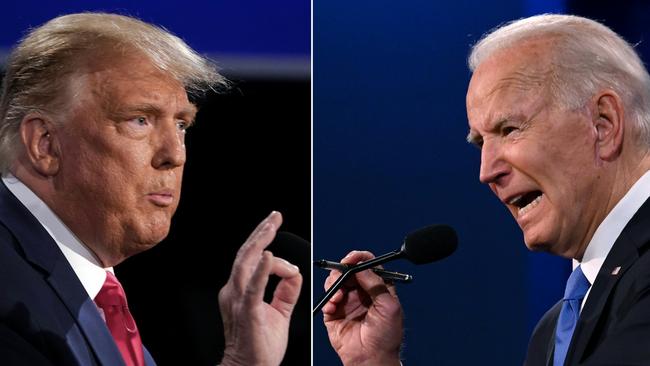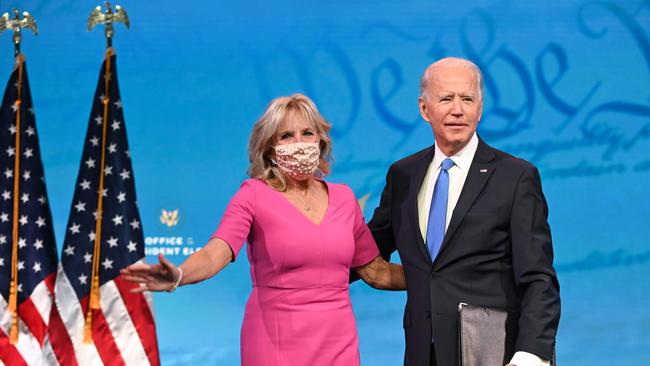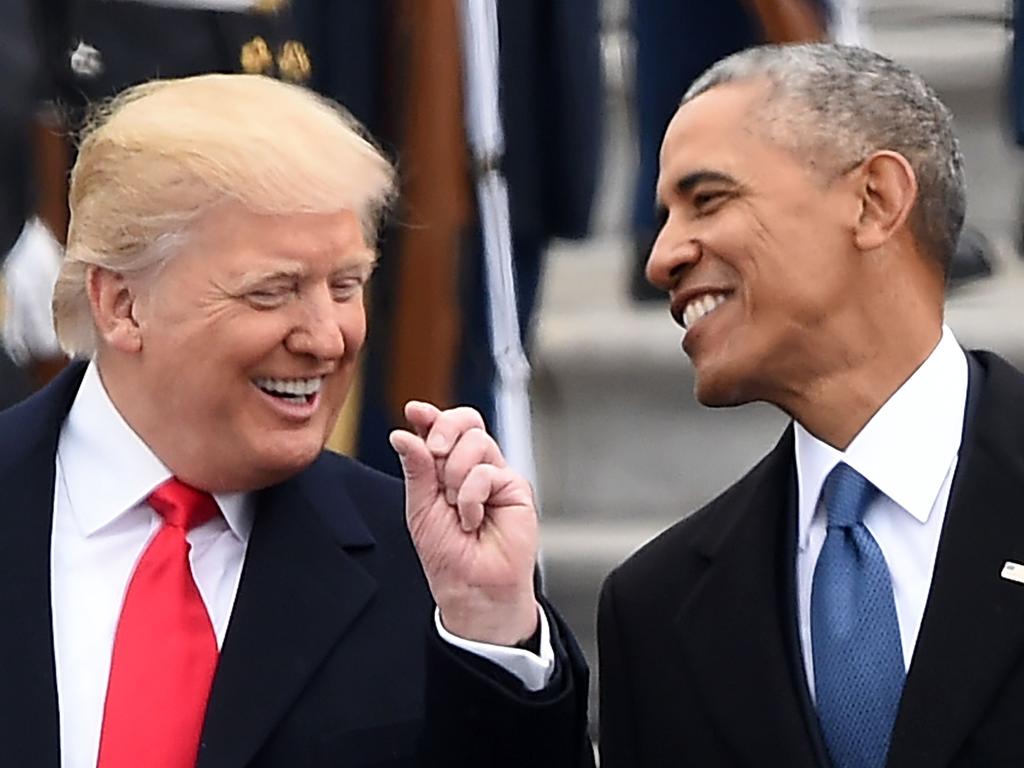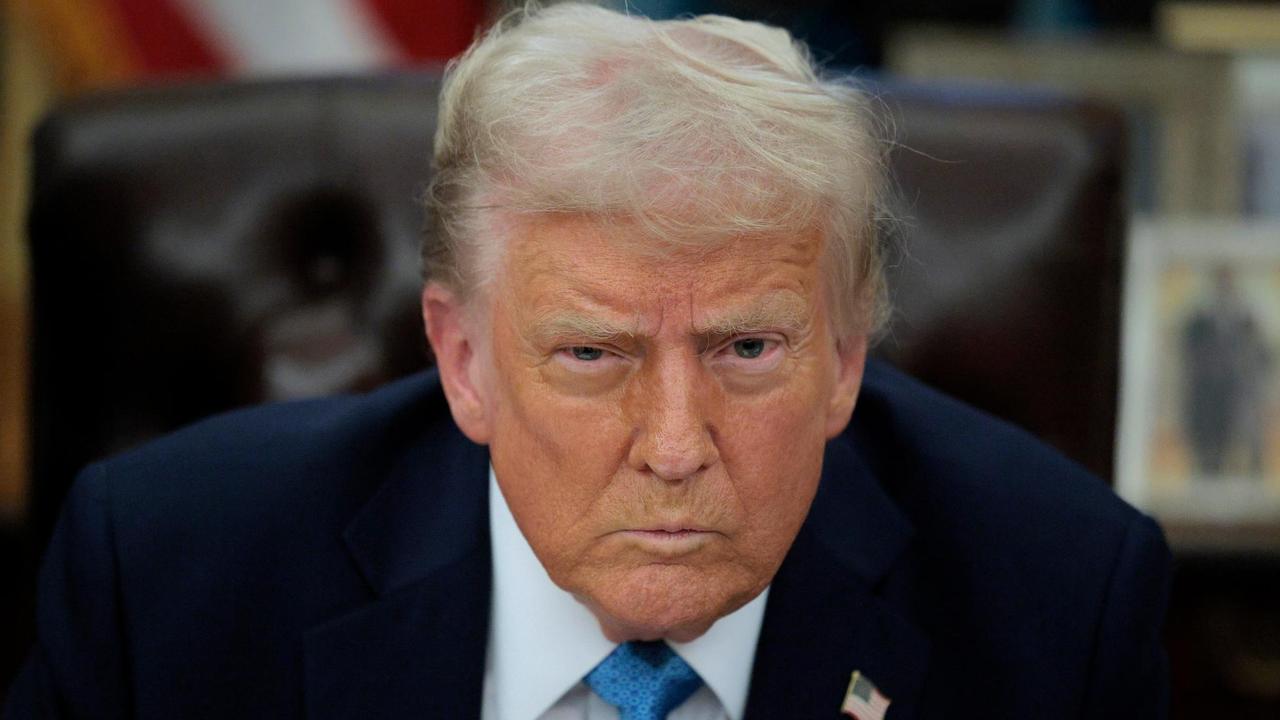Joe Biden starts to thaw America’s deepest freeze
More and more Republicans are giving up on the tantrums of Donald Trump.

The first snowfall of winter has painted Washington white, a reminder that at least the seasons are acting as they should in the nation’s capital.
The same cannot be said for America’s President. As Donald Trump approaches his final Christmas in the White House, he continues to fume and stew over an election he says was stolen from him.
It has now been six weeks since it became clear that Joe Biden won the November 3 poll, a victory made official this week when the electoral college cast its votes for him, by 306 to 232.
The formal vote of electoral college members was seen by many as the likely end to Trump’s fight to overturn the result, simply because it is now impossible to reverse the outcome.
But the President has made it clear once and for all this week that he will never concede that he lost this election to Biden, at least not fairly.
He continues to tweet and retweet numerous claims of election fraud even after his most powerful ally, Republican Senate majority leader Mitch McConnell, broke his silence over the result to declare that Biden was the president-elect.
Trump hit back at McConnell, saying it was “too soon” to declare a Biden victory and that “the Republican Party must learn to fight. People are angry”.
But it is a testament to Trump’s ongoing influence and power that Republicans stuck with him for so long in his quixotic battle to prove that Biden’s victory was fraudulent.

For nearly six weeks almost every congressional Republican studiously avoided contradicting the President in public, even as Trump’s legal campaign racked up loss after loss in the courts.
Democrats have accused Republicans of putting self-preservation ahead of principle, saying that their silence has helped enable Trump to undermine confidence in the democratic process.
But the calculation of most Republicans, at least until McConnell’s declaration this week, was that it was not worth crossing a President who will remain a kingmaker in his party and may even run again in 2024.
They have seen Trump’s ferocious attacks on the Republican governors of Georgia and Arizona after they refused to interfere in their election processes to try to overturn Biden’s win in those traditionally Republican states.
“Who is a worse Governor, @BrianKempGA of Georgia or @dougducey of Arizona??? These are two RINO (Republican in Name Only) Republicans who fought against me and the Republican Party harder than any Democrat. They allowed states that I won easily to be stolen. Never forget, vote them out of office,” Trump tweeted.
But for Republicans, straddling the line between loyalty to their President and the reality of the election outcome has become all but impossible after the electoral college ratified Biden’s win.
As McConnell put it: “The electoral college has spoken, so I want to congratulate president-elect Joe Biden.”
McConnell’s comments amounted to a party-wide edict to accept the election result, and a number of senior Senate Republicans have now come out to acknowledge a Biden victory including Lindsey Graham, Roy Blunt and John Cornyn. But many other Republicans have remained silent and a handful, such as Rand Paul, are still actively backing the President’s claims.
“The fraud happened,” Paul told a Senate hearing this week. “The election in many ways was stolen.”
Trump aide Stephen Miller claims the President will keep fighting the result up until the January 20 inauguration and that there is “more than enough time to right the wrong of this fraudulent election result”.

But there is no realistic chance of any legal successful legal action between now and January 20 that would change the result. In more than 50 cases presided over by 88 judges, including 39 who were appointed by Republicans, the Trump legal team has failed to secure a single victory. The US Supreme Court has rejected two lawsuits out of hand and appears to have no appetite for the issue. This has infuriated Trump, who hoped that his instalment of three conservative judges during his term would lead the court to back his claims.
“The Supreme Court really let us down. No Wisdom, No Courage!” he tweeted.
McConnell has moved to try to head off a possible last stand by Trump when a joint session of congress meets on January 6 to count the electoral college votes. Usually this is a straightforward procedure that formalises the acceptance of the election outcome by congress.
But at least one Republican, house member Mo Brooks from Alabama, has said he will challenge the electoral vote on that day. If a Senate Republican also chooses to join Brooks then by law every member of congress must state publicly whether or not to accept the election result.
There is zero chance that Biden’s win would be overturned because Democrats have the majority and, in any case, most Republicans would refuse to engage in such a blatant disregard for the democratic process.
McConnell has privately advised his party strongly against any challenge to the vote because it would force Republicans into the excruciating position of publicly choosing between Trump or democracy.
So, while Trump will never concede that he lost fairly to Biden, he has no realistic options left, politically or legally, to prevent Biden becoming president.
But how much damage has the President done in fighting the election outcome in such an extraordinary fashion?
Although the courts have proven there was no basis to Trump’s claims of fraud, the President has taken his supporters along with him. Various polls show between 75 and 82 per cent of those who voted for Trump do not believe the election was fair or that Biden will be a legitimate president.
This is a stunning display of the loyalty that Trump still commands from his base. The question is whether such attitudes will fade when Trump leaves or whether Trump is causing long-term damage by deliberately undermining faith in US elections and the democratic process.
“If enough people believe that a government is not elected legitimately, that’s a huge problem for democracy,” says Keith Darden, a political science professor at the American University in Washington. “Once reality gets degraded, it’s really hard to get it back.”
There is a danger for Trump — if he runs again in 2024 — that his attacks on the integrity of the election process will rebound on him by hurting the Republican vote, rather than the Democrats.
A Fox News poll this week found that only 11 per cent of voters say the events of this presidential election will make them less likely to vote in the next election. But when broken down on partisan lines, just 6 per cent of Democrats say they are less likely to vote compared with 16 per cent of Republicans.
Republican leaders are desperately hoping Trump’s attack on the election system will not dampen voter turnout among Republicans in the critical run-off elections in Georgia for two Senate seats on January 5.
If Democrats win both those contests, they would hold an effective majority in the Senate, giving Biden the ability to implement much more of his agenda than he would if Republicans maintain their current Senate majority.
While Trump will continue to stew on the election outcome, many believe his final month in office could produce further shocks.
There is speculation the President will announce a slew of high-profile presidential pardons before he leaves office.
These could include his former deputy campaign manager, Rick Gates, who pleaded guilty to financial fraud; former Trump campaign adviser George Papadopoulos, who pleaded guilty to lying to the FBI; former adviser Steve Bannon, who is charged with fraud, and former campaign chairman Paul Manafort, who is serving 7½ years in prison on fraud and conspiracy charges.
There is also speculation that Trump may seek to pre-emptively pardon members of his family, such as children Ivanka, Eric and Don Jr, to protect them from any charges that might be levelled against them after Trump leaves the White House.
Trump may also seek to sack FBI chief Christopher Wray and CIA head Gina Haspel. Attorney-General William Barr resigned this week rather than risk being sacked by the President, who was unhappy Barr had stated publicly that he had seen no evidence of major election fraud.
President-elect Biden this week launched his strongest attack yet on Trump’s refusal to accept the election result.
“In America, politicians don’t take power — the people grant it to them,” Biden said. “And we now know that nothing — not even a pandemic or an abuse of power — can extinguish that flame (of democracy).”
In the absence of Trump — who has barely made a public appearance in recent weeks — Biden has all but adopted the mantle of president already. He is making presidential-style speeches on how he plans to fight the coronavirus, roll out the vaccine and rebuild the economy. Biden is also making overtures to his Republican Senate opponents, with whom he will have to negotiate to pass his agenda, especially if Democrats lose one of the run-off elections in Georgia.
Biden spoke for the first time this week with McConnell as well as fellow powerbroker Graham. Biden and McConnell were longtime Senate colleagues and have a relationship of mutual respect rather than outright antagonism, despite their party differences.
Biden speculated this week that he would need “six to eight months” to forge a new working relationship with Republicans.
“You’re going to be surprised,” he said. “We’re going to have a lot of people wanting to work with us.”
While Biden looks to forge relationships with Republicans, he is struggling to keep unity within Democrat ranks as factions in the party question his choices for cabinet positions.
So far Biden’s cabinet choices have focused on people he has worked with previously and knows well, such as his nominated secretary of state Antony Blinken, defence secretary General Lloyd Austin and national security adviser Jake Sullivan.
Many of Biden’s choices are moderates who have experience of some sort with the Obama administration and none of them — with the exception of former mayor Pete Buttigieg as transportation secretary — are true outsiders to Washington.
But the left of the party and liberal groups are uncomfortable with the establishment-heavy make-up of the Biden cabinet. They ask whether it will be a rehash of old ideas and they question whether such a group will be bold enough to pioneer new policies and directions for the Democrats.
“You have an individual appointment here, an individual appointment there,” says high-profile left-wing congresswoman Alexandria Ocasio-Cortez. “(But) what is the overall message from the big picture in this entire cabinet put together?”
Biden is also getting pressured by liberal identity-based groups and civil rights groups to include more racial and gender diversity. Yet he has already chosen a highly diverse cabinet with at least seven women, at least five people of colour and the first openly gay member of cabinet in Buttigieg.
So far, Biden has resisted the demands of his party’s left without alienating it altogether. But the rumblings are a portent of the delicate balancing act he faces as president of a party with a restless liberal wing.
Biden will take centre stage again early next week when he is due to receive the coronavirus vaccine. The 78-year-old says he didn’t want to jump the queue but he argues that getting the jab publicly will help reduce scepticism about the safety of the vaccine.
Even with Biden safely vaccinated against the virus, his inauguration will be nothing like previous presidential inaugurations. He will be sworn in at the same spot outside the Capitol Building like other presidents, but there will be sharply fewer dignitaries on stage with him because of the need for social distancing.
There will also be no large inauguration parties and no large crowds. And most unusually of all, there will almost certainly be no Trump.
Trump has not flagged his intentions but he is not expected to attend a ceremony to honour the winner of an election he claims he did not lose. This would make him the first president to shun an inauguration since 1869. It seems Trump is destined to end his presidency just as he has conducted it — unconventionally.






